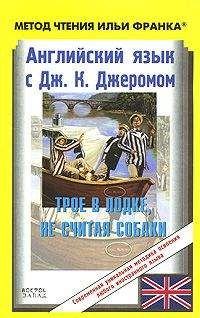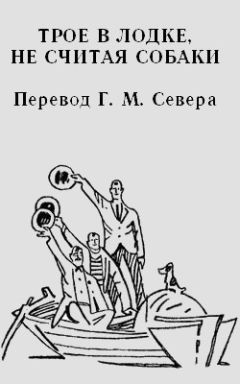Jerome Jerome - Английский язык с Джеромом К. Джеромом. Трое в лодке, не считая собаки
Strangers were allowed three guesses, and most of them guessed a different tune each time (незнакомым предоставлялись три попытки угадать, и большинство из них называло другую мелодию каждый раз; guess — гипотеза, предположение; догадка).
Harris was disagreeable after supper (Гаррис был хмурым после ужина), — I think it must have been the stew that had upset him (думаю, это, должно быть, рагу расстроило его): he is not used to high living (он не привык к роскошной жизни; high living — жизнь на широкую ногу), — so George and I left him in the boat, and settled to go for a mouch round Henley (поэтому мы с Джорджем оставили его в лодке и решили пойти пошататься по Хенли). He said he should have a glass of whisky and a pipe, and fix things up for the night (он сказал, выпьет стакан виски, /выкурит/ трубку и подготовит вещи = лодку к ночи). We were to shout when we returned (мы должны были крикнуть, когда вернемся), and he would row over from the island and fetch us (и он приплывет с острова и заберет нас; to fetch — принести, достать; сходить за кем-либо).
repertoire [ˈrepǝtwɑ:] island [ˈaɪlǝnd]
Young Jefferson only learnt to play one tune on those bagpipes; but I never heard any complaints about the insufficiency of his repertoire — none whatever. This tune was "The Campbells are Coming, Hooray — Hooray!" so he said, though his father always held that it was "The Blue Bells of Scotland." Nobody seemed quite sure what it was exactly, but they all agreed that it sounded Scotch.
Strangers were allowed three guesses, and most of them guessed a different tune each time.
Harris was disagreeable after supper, — I think it must have been the stew that had upset him: he is not used to high living, — so George and I left him in the boat, and settled to go for a mouch round Henley. He said he should have a glass of whisky and a pipe, and fix things up for the night. We were to shout when we returned, and he would row over from the island and fetch us.
"Don't go to sleep, old man (не засни, старина)," we said as we started (сказали мы, отправляясь в путь).
"Not much fear of that while this stew's on (попробуй засни: «не много опасения из-за этого», пока это рагу действует)," he grunted, as he pulled back to the island (проворчал он, гребя обратно к острову).
Henley was getting ready for the regatta, and was full of bustle (Хенли готовился к регате и был полон суеты). We met a goodish number of men we knew about the town (мы встретили много людей, которых знаем = знакомых в городе), and in their pleasant company the time slipped by somewhat quickly (и в их приятной компании время пробежало довольно быстро; to slip by — проскользнуть мимо; пролететь, пробежать /о времени/); so that it was nearly eleven o'clock before we set off on our four-mile walk home (так что было почти одиннадцать часов, когда мы пустились в нашу четырехмильную прогулку домой) — as we had learned to call our little craft by this time (как мы научились = привыкли называть наше маленькое судно к этому времени).
It was a dismal night, coldish, with a thin rain falling (была унылая, холодная ночь, шел мелкий дождь; coldish — холодноватый; довольно холодный); and as we trudged through the dark, silent fields, talking low to each other (и, устало бредя по темным безмолвным полям, мы тихо разговаривали /друг с другом/; to trudge — идти с трудом, устало тащиться; продираться сквозь), and wondering if we were going right or not, we thought of the cosy boat (и задавались вопросом, правильно идем или нет; думали об уютной лодке), with the bright light streaming through the tight-drawn canvas (и ярком свете, льющемся сквозь туго натянутую парусину; to draw — тащить, тянуть); of Harris and Montmorency, and the whisky, and wished that we were there (о Гаррисе и Монморенси, о виски, и нам хотелось быть там).
regatta [rɪˈɡætǝ] bustle [ˈbʌs(ǝ)l] cosy [ˈkǝuzɪ]
"Don't go to sleep, old man," we said as we started.
"Not much fear of that while this stew's on," he grunted, as he pulled back to the island.
Henley was getting ready for the regatta, and was full of bustle. We met a goodish number of men we knew about the town, and in their pleasant company the time slipped by somewhat quickly; so that it was nearly eleven o'clock before we set off on our four-mile walk home — as we had learned to call our little craft by this time.
It was a dismal night, coldish, with a thin rain falling; and as we trudged through the dark, silent fields, talking low to each other, and wondering if we were going right or not, we thought of the cosy boat, with the bright light streaming through the tight-drawn canvas; of Harris and Montmorency, and the whisky, and wished that we were there.
We conjured up the picture of ourselves inside, tired and a little hungry (мы воображали, как сидим в лодке, усталые и немного голодные; to conjure up — вызывать в воображении; заставлять появиться как по волшебству); of the gloomy river and the shapeless trees (/воображали/ темную, мрачную реку и бесформенные деревья); and, like a giant glow-worm underneath them, our dear old boat, so snug and warm and cheerful (и, словно огромный светляк под ними, нашу милую старую лодку, такую уютную, теплую и веселую; glow-worm — жук-светляк; glow — свет, отблеск, зарево; worm — червь; snug — уютный, удобный; защищенный от непогоды). We could see ourselves at supper there, pecking away at cold meat (видели себя за ужином там = представляли, как сидим за ужином, едим неторопливо холодное мясо; to peck — клевать, отщипывать, мало есть), and passing each other chunks of bread (и передавая друг другу ломти хлеба); we could hear the cheery clatter of our knives (мы могли слышать радостный звон ножей), the laughing voices, filling all the space (веселые голоса, заполняющие все пространство), and overflowing through the opening out into the night (и выливающиеся через щель /в парусине/ в ночь = разливающиеся в ночи; to overflow — переливаться через край, переполняться; заливать, затоплять; opening — отверстие, дыра, брешь, щель). And we hurried on to realise the vision (и мы торопились претворить в жизнь это видение).
We struck the tow-path at length, and that made us happy (мы пошли, наконец, по тропинке вдоль берега, и это обрадовало нас; to strike a path — направляться к чему-либо; двигаться в направлении чего-либо); because prior to this we had not been sure whether we were walking towards the river or away from it (потому что до этого мы не были уверены, идем ли мы к реке или от нее), and when you are tired and want to go to bed uncertainties like that worry you (а когда вы устанете и хотите спать, такие сомнения тревожат вас). We passed Shiplake as the clock was striking the quarter to twelve (мы миновали Шиплейк, когда часы били без четверти двенадцать); and then George said, thoughtfully (и потом Джордж сказал задумчиво):
conjured [ˈkʌnʤǝd] giant [ˈʤaɪǝnt]
We conjured up the picture of ourselves inside, tired and a little hungry; of the gloomy river and the shapeless trees; and, like a giant glow-worm underneath them, our dear old boat, so snug and warm and cheerful. We could see ourselves at supper there, pecking away at cold meat, and passing each other chunks of bread; we could hear the cheery clatter of our knives, the laughing voices, filling all the space, and overflowing through the opening out into the night. And we hurried on to realise the vision.
We struck the tow-path at length, and that made us happy; because prior to this we had not been sure whether we were walking towards the river or away from it, and when you are tired and want to go to bed uncertainties like that worry you. We passed Shiplake as the clock was striking the quarter to twelve; and then George said, thoughtfully:
"You don't happen to remember which of the islands it was, do you (ты случайно не помнишь, который из островов это был = где наш остров)?"
"No," I replied, beginning to grow thoughtful too (ответил я, тоже становясь задумчивым), "I don't (не помню). How many are there (сколько их /вообще/)?"
"Only four (всего четыре)," answered George. "It will be all right, if he's awake (все будет хорошо, если он не спит)."
"And if not (а если спит)?" I queried; but we dismissed that train of thought (спросил я, но мы прогнали /от себя/ эту мысль: «такой ход мыслей»).
We shouted when we came opposite the first island, but there was no response (мы крикнули, когда встали напротив = поравнялись с первым островом, но ответа не было); so we went to the second, and tried there, and obtained the same result (тогда мы пошли ко второму, попробовали /крикнуть/ здесь и получили тот же результат).
shouted [ˈʃautɪd] response [rɪˈspɔns]
"You don't happen to remember which of the islands it was, do you?"
"No," I replied, beginning to grow thoughtful too, "I don't. How many are there?"
"Only four," answered George. "It will be all right, if he's awake."
"And if not?" I queried; but we dismissed that train of thought.
We shouted when we came opposite the first island, but there was no response; so we went to the second, and tried there, and obtained the same result.
"Oh! I remember now (я теперь вспомнил)," said George; "it was the third one (это третий остров)."
And we ran on hopefully to the third one, and hallooed (и мы с надеждой побежали к третьему и громко крикнули).
No answer (никакого ответа)!
The case was becoming serious (дело становилось серьезным). It was now past midnight (теперь /уже/ было за полночь). The hotels at Shiplake and Henley would be crammed (гостиницы в Шиплейке и Хенли наверняка переполнены); and we could not go round, knocking up cottagers and householders in the middle of the night (мы не могли ходить кругом, будя жителей посреди ночи; to knock up — поднять, разбудить стуком; cottager — обитатель хижины, коттеджа; крестьянин; householder — съемщик дома или квартиры; глава семьи; домовладелец), to know if they let apartments (чтобы узнать, не сдадут ли они комнаты)! George suggested walking back to Henley and assaulting a policeman (Джордж предложил вернуться в Хенли и напасть на полисмена), and so getting a night's lodging in the station-house (и таким образом получить ночлег в полицейском участке). But then there was the thought (но затем возникла мысль), "Suppose he only hits us back and refuses to lock us up (предположим = а вдруг он просто даст нам сдачи и откажется арестовать нас; to lock up — запирать, сажать в тюрьму)!"
We could not pass the whole night fighting policemen (мы не могли провести всю ночь, сражаясь с полисменами). Besides, we did not want to overdo the thing and get six months (кроме того, мы не хотели переборщить и получить шесть месяцев /тюрьмы/; to overdo — заходить слишком далеко, переусердствовать).
cottager [ˈkɔtɪʤǝ] assaulting [ǝˈsɔ:ltɪŋ]



